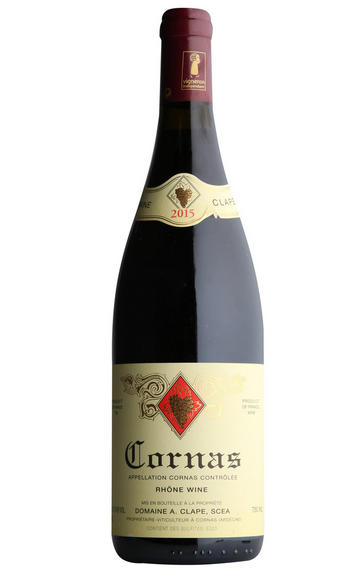
2015 Cornas, Domaine A. Clape, Rhône
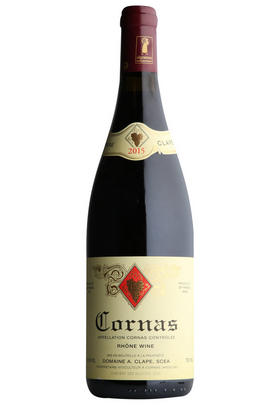
Critics reviews
Dark purple. Deep-pitched, mineral-accented black and blue fruit liqueur, olive and floral pastille aromas develop peppery spice and cola notes with aeration. Sappy and deeply concentrated on the palate, offering boysenberry, cassis and fruitcake flavours that are sharpened by smoky mineral and cracked pepper flourishes. The mineral note drives the extremely long, energetic finish, and chewy tannins provide shape and solid grip.
Drink 2025 - 2036
Josh Raynolds, Vinous.com (April 2018)
Exquisite leather and liquorice flavour with deep black fruit and intense, unrelenting tannin. Many years are needed to unlock the secrets within!
Drink 2020 - 2030
Richard Hemming MW, JancisRobinson.com (January 2018)
Clapes flagship 2015 Cornas is enormously complex and compelling. Almond skin, cherries, blood and herbal notes all combine on the nose, while on the palate this medium to full-bodied wine is firmly tannic but ripe and balanced, with a rich, velvety and nearly endless finish.
Drink 2023 - 2040
Joe Czerwinski, Wine Advocate (December 2017)
A more floral and perfumed wine than the 2015 Renaissance. Violets add interest to plenty of peppery red plums and wild red berries. Darker berries, graphite and stony notes, too. So much here. The palate arrives in a silky ribbon-like mode, it has a very long core of blackberries, liquorice and spiced plum flavours. Superior definition in the tannin department. A taut finish.
Drink from 2025
James Suckling, JamesSuckling.com (December 2018)
The grand vin of the estate is the 2015 Cornas, and it's even more inky colored than the Renaissance, with a saturated purple/bluish color. It offers a truly profound bouquet of black cherries, melted asphalt, ground pepper, exotic flowers and graphite, as well as the classic iodine/bloodiness I always find in this cuvée. Full-bodied, beautifully concentrated, and seamless, with sweet tannin and a stacked mid-palate, it has an almost Hermitage-like liquid rock character, shocking elegance and purity, and a huge finish. This is Cornas at its finest – hats off to the Clape family! It's relatively accessible now, yet I suspect it will close down with a few years of bottle age, so try one (or two) now and save the rest for after 2025.
Drink 2018 - 2043
Jeb Dunnuck, JebDunnuck.com (January 2018)
About this WINE
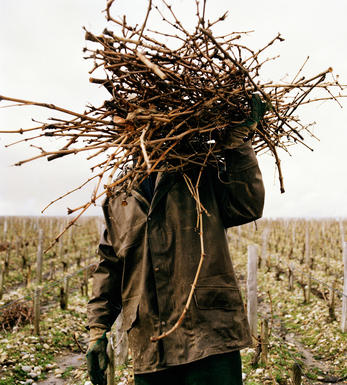
Domaine Clape
Auguste Clape produces unquestionably the finest wines in Cornas from his minute cellars located on the RN98 in the middle of the appellation. He has 11 acres of vineyards, the majority being superbly well sited on the steep hillside surrounding the village. The average vine age is high, with some being over 100 years old.
The wines are vinified traditionally and are then matured in wooden barrels for 18 months. No new oak whatsoever is used. Clape`s wines tend to be opaque in colour, impenetrable on the nose and densely tannic when young. However, with age, the tannins soften and they develop a seductive perfume of creamy, peppery, black fruits, leading on to complex flavours and nuances on the palate. The best examples can last for 20-30 years. Auguste, who is now in his late 60s, is gradually passing over the reins to his son, Pierre-Marie.
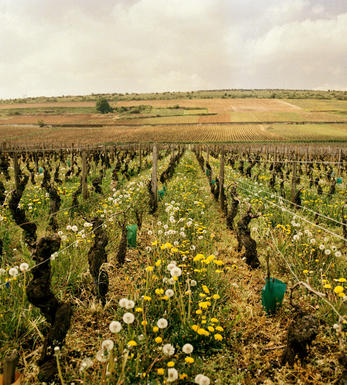
Cornas
Cornas is a small appellation, just 150 hectares, located south of St Joseph. It’s on the west side of the river. The name “Cornas” comes from an old Celtic dialect term, meaning “burnt land”, so it’s no surprise that on the steep terraces here, facing south, temperatures are significantly higher than those in Hermitage, which is just 7km away.
The granite soils are home to the Syrah grape, producing reds that sit somewhere between those of Hermitage and Côte-Rôtie. These are strong and powerful wines, with nervy acidity and a robust, rustic charm to them. Their prominent tannins mean that they often demand time in the cellar to express their underlying elegance and complexity.
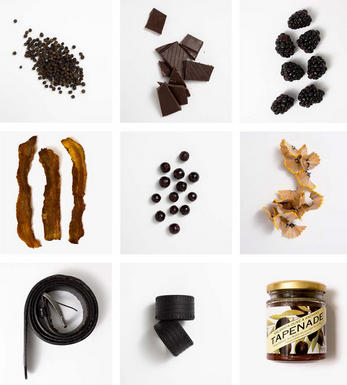
Syrah/Shiraz
A noble black grape variety grown particularly in the Northern Rhône where it produces the great red wines of Hermitage, Cote Rôtie and Cornas, and in Australia where it produces wines of startling depth and intensity. Reasonably low yields are a crucial factor for quality as is picking at optimum ripeness. Its heartland, Hermitage and Côte Rôtie, consists of 270 hectares of steeply terraced vineyards producing wines that brim with pepper, spices, tar and black treacle when young. After 5-10 years they become smooth and velvety with pronounced fruit characteristics of damsons, raspberries, blackcurrants and loganberries.
It is now grown extensively in the Southern Rhône where it is blended with Grenache and Mourvèdre to produce the great red wines of Châteauneuf du Pape and Gigondas amongst others. Its spiritual home in Australia is the Barossa Valley, where there are plantings dating as far back as 1860. Australian Shiraz tends to be sweeter than its Northern Rhône counterpart and the best examples are redolent of new leather, dark chocolate, liquorice, and prunes and display a blackcurrant lusciousness.
South African producers such as Eben Sadie are now producing world- class Shiraz wines that represent astonishing value for money.


Buying options
Add to wishlist
Description
The grand vin of the estate is the 2015 Cornas, and it's even more inky colored than the Renaissance, with a saturated purple/bluish color. It offers a truly profound bouquet of black cherries, melted asphalt, ground pepper, exotic flowers and graphite, as well as the classic iodine/bloodiness I always find in this cuvée. Full-bodied, beautifully concentrated, and seamless, with sweet tannin and a stacked mid-palate, it has an almost Hermitage-like liquid rock character, shocking elegance and purity, and a huge finish. This is Cornas at its finest – hats off to the Clape family! It's relatively accessible now, yet I suspect it will close down with a few years of bottle age, so try one (or two) now and save the rest for after 2025.
Drink 2018 - 2043
Jeb Dunnuck, JebDunnuck.com (January 2018)
wine at a glance
Delivery and quality guarantee